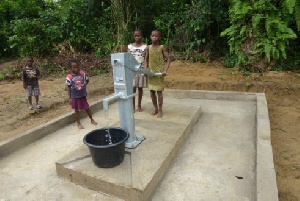Most of the mechanised boreholes dug for rural communities within the Tarkwa Nsueam Municipality Assembly have become white elephants and can no longer serve the potable water needs of the beneficiary communities.
The boreholes, dug by corporate bodies as well as the District assembly which were mainly solar powered either have a knot not functioning or a whole system breakdown, resulting in short supply of clean water, with communities relying on streams, springs and rivers for their water needs.
A visit by members of the Ghana Water and Sanitation Journalists Network and the Hope for Future Generation (HFFG), an NGO implementing the Watershed project in the area, revealed that communities such as Teberebe, Dadwen, Kyekyerew, Nyamebekyere, Domeabra and Mile 10.5 all have teething problems with their mechanised boreholes which served as the main source of drinking water.
The visit also revealed that, where some of these facilities may be functioning, community members preferred to drink from springs, streams and rivers describing such sources of water as tastier than the boreholes.
The Watershed project, is a five year project to improve on Water, Sanitation and Hygiene practices among rural communities to improve the general health conditions.
Ms Mercy Amokwandoh, Project Officer for HFFG, implementing the Watershed pointed out that water was not a free commodity and that it was time communities became more responsible and owned such facilities to ensure that they lasted.
Reverend Samuel Asiedu, a community Advocate with the Nyamebekyere community where the team visited took the team members to the three water sources used by the community to the neglect of the one borehole in the area.
He said the water bodies served as the major a source of drinking and bathing water which had resulted in most children contracting bilharzia.
Rev. Asiedu was therefore grateful for the introduction of the project and the awareness it had created on water, sanitation and hygiene, “hitherto, we used to dump our refuse at our backyard, so every household had a heap of refuse around, but now we have one central point to dump the refuse far from the cottage”.
Open defecation in the Nyamebekyere community is also improving following the construction of places of convenience through the use of local materials, rev Asiedu pointed out.
General News of Monday, 11 December 2017
Source: ghananewsagency.org













